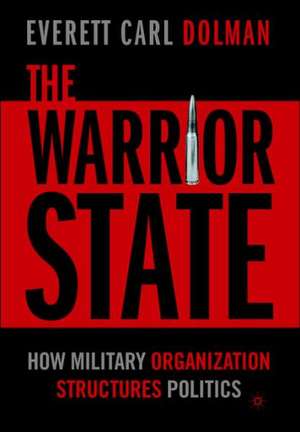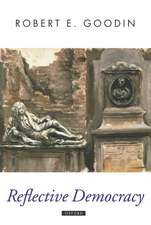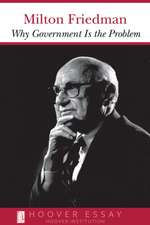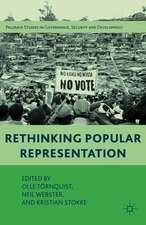The Warrior State: How Military Organization Structures Politics
Autor E. Dolmanen Limba Engleză Hardback – 31 ian 2005
| Toate formatele și edițiile | Preț | Express |
|---|---|---|
| Paperback (1) | 386.39 lei 6-8 săpt. | |
| Palgrave Macmillan US – 10 dec 2015 | 386.39 lei 6-8 săpt. | |
| Hardback (1) | 386.39 lei 6-8 săpt. | |
| Palgrave Macmillan US – 31 ian 2005 | 386.39 lei 6-8 săpt. |
Preț: 386.39 lei
Nou
Puncte Express: 580
Preț estimativ în valută:
73.93€ • 77.40$ • 61.18£
73.93€ • 77.40$ • 61.18£
Carte tipărită la comandă
Livrare economică 07-21 aprilie
Preluare comenzi: 021 569.72.76
Specificații
ISBN-13: 9781403966612
ISBN-10: 1403966613
Pagini: 256
Ilustrații: VII, 220 p. 1 illus.
Dimensiuni: 170 x 244 x 13 mm
Greutate: 0.38 kg
Ediția:2004
Editura: Palgrave Macmillan US
Colecția Palgrave Macmillan
Locul publicării:New York, United States
ISBN-10: 1403966613
Pagini: 256
Ilustrații: VII, 220 p. 1 illus.
Dimensiuni: 170 x 244 x 13 mm
Greutate: 0.38 kg
Ediția:2004
Editura: Palgrave Macmillan US
Colecția Palgrave Macmillan
Locul publicării:New York, United States
Cuprins
Arms and States: Introduction The Authoritarian Bargain and the Democratic Moment The Socio-Political Effects of Military Organization Proto-States: Athens and Sparta Early Modern Warfare: Swiss, Dutch, and French Military Reforms and the Transition to Democracy Military Organization and the Prusso-German State Post-Cold War Implications and the American Military Conclusions
Recenzii
"The Warrior State now stands as the definitive treatment of civil-military relations and politics. Through case studies that range from antiquity to modern times, the book answers time-honored questions about military structure and war, democracy and the liberal state. The case studies reveal that the military can influence political development through both war and other mechanisms. This well-written book brings out the nuances about military organization and politics on the basis of evidence gathered from places and times as diverse as ancient Athens and Sparta, early republics in Europe, the Prusso-German state and the contemporary United States. In sum, The Warrior State should be required reading for those with interests in international relations, foreign policy and civil-military relations." - Patrick James, University of Missouri
"Dolmanbliog s intellectually challenging and courageous book examines the connection between liberty and the growth of the military, arguing that military service promotes social equalization, sustains communal loyalties and supports trust while mercenaries and private militias tend, by contrast, to corrode democracies. In an age when outsourcing military activities to private companies is on the rise, this important and timely study should be read by everyone who is fearful about the future of democracy and the dangers of militarism." - Bryan Turner, Cambridge University
"In Warrior State, Professor Dolman has givena powerful statement on the
role of the military in state formation throughout history. The book is
well written and will be widely read." - Brian Blouet, The College of William and Mary
"Dolman makes credible the proposition that military organization, rather than wars, impact the structures of political systems. Using theoretical arguments and cases ranging from classical Greece to today, he specifies the ways military imperatives contribute to the opening and strengthening of liberal democratic institutions. This is a bold and different perspective from that linking the military to authoritarian politics. The conclusion addresses the importance and challenges of a civilian military for democratic development."
- Henry Teune, University of Pennsylvania
"This study challenges traditional views of the military as a constant obstacle to democratic state development. Using historical case studies, Dr. Dolman makes a persuasive argument that military participation has often been the 'tipping component' in the 'process of democratization.' This volume is must reading not only for students of military history and policy, but for all those concerned with issues of democratization in today's chaotic world."
- Dr. Richard Millett, Southern Illinois University
"A truly seminal work that brilliantly analyzes the interrelationships between the military and society. Dolman's case studies establish the counterintuitive proposition that structuring a military into a more effective sword against foreign enemies can also make it a better tool for creating and sustaining democracy. The book informs today's debates over critical issues such as women in combat, gays in the military, the role of mercenaries, conscript versus all-volunteer forces, and the democratic peace proposition. The Warrior State is the most comprehensive and thoughtful treatment of civil-military relations in a generation. It clearly deserves a place of honor alongside classics such as Arms and Men, The Professional Soldier, and The Soldier and the State."
- Dr. Peter L. Hays, Institute for National Strategic Studies
"Dolmanbliog s intellectually challenging and courageous book examines the connection between liberty and the growth of the military, arguing that military service promotes social equalization, sustains communal loyalties and supports trust while mercenaries and private militias tend, by contrast, to corrode democracies. In an age when outsourcing military activities to private companies is on the rise, this important and timely study should be read by everyone who is fearful about the future of democracy and the dangers of militarism." - Bryan Turner, Cambridge University
"In Warrior State, Professor Dolman has givena powerful statement on the
role of the military in state formation throughout history. The book is
well written and will be widely read." - Brian Blouet, The College of William and Mary
"Dolman makes credible the proposition that military organization, rather than wars, impact the structures of political systems. Using theoretical arguments and cases ranging from classical Greece to today, he specifies the ways military imperatives contribute to the opening and strengthening of liberal democratic institutions. This is a bold and different perspective from that linking the military to authoritarian politics. The conclusion addresses the importance and challenges of a civilian military for democratic development."
- Henry Teune, University of Pennsylvania
"This study challenges traditional views of the military as a constant obstacle to democratic state development. Using historical case studies, Dr. Dolman makes a persuasive argument that military participation has often been the 'tipping component' in the 'process of democratization.' This volume is must reading not only for students of military history and policy, but for all those concerned with issues of democratization in today's chaotic world."
- Dr. Richard Millett, Southern Illinois University
"A truly seminal work that brilliantly analyzes the interrelationships between the military and society. Dolman's case studies establish the counterintuitive proposition that structuring a military into a more effective sword against foreign enemies can also make it a better tool for creating and sustaining democracy. The book informs today's debates over critical issues such as women in combat, gays in the military, the role of mercenaries, conscript versus all-volunteer forces, and the democratic peace proposition. The Warrior State is the most comprehensive and thoughtful treatment of civil-military relations in a generation. It clearly deserves a place of honor alongside classics such as Arms and Men, The Professional Soldier, and The Soldier and the State."
- Dr. Peter L. Hays, Institute for National Strategic Studies
Notă biografică
EVERETT CARL DOLMAN is Professor of Comparative Military Studies in the School of Advanced Air and Space Studies, at the United States Air Force University, Colorado, USA.

















